
MBTAAnalysis: A look inside the MBTA
0 Comments
/
The MBTA shuttles over a million passengers a day around Greater…
 https://pioneerinstitute.org/wp-content/uploads/CloseupClock-1.jpg
739
1244
Mary Connaughton
https://pioneerinstitute.org/wp-content/uploads/logo_440x96.png
Mary Connaughton2017-02-20 12:34:192017-02-21 09:47:58The Clock is Ticking…….
https://pioneerinstitute.org/wp-content/uploads/CloseupClock-1.jpg
739
1244
Mary Connaughton
https://pioneerinstitute.org/wp-content/uploads/logo_440x96.png
Mary Connaughton2017-02-20 12:34:192017-02-21 09:47:58The Clock is Ticking…….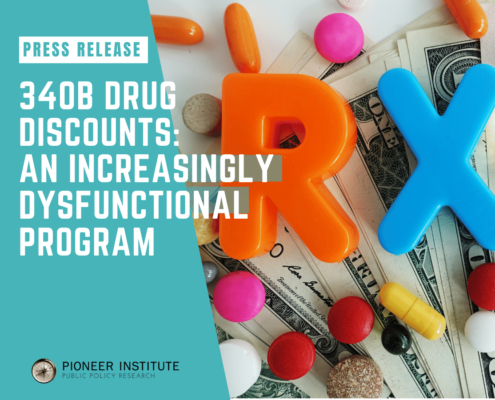
Massachusetts Hospitals Pull Back on Charity Care as Revenue from Federal 340B Drug Discount Program Explodes
Over the past decade, the revenue for hospitals generated by the federal 340B drug discount program, initially intended to serve low-income, uninsured populations, has exploded even while a number of important Massachusetts hospitals have reduced the level of charity care they provide, according to a new study published by Pioneer Institute. The Pioneer Institute study, “340B Drug Discounts: An Increasingly Dysfunctional Program,” notes that nationwide, 340B drug sales rose from $9 billion in 2014 to $38 billion in 2020.

Study: Legislature Likely to Reduce Spending on Education and Transportation from Other Revenue Sources, Replace Cuts with Surtax Money
Revenue from a ballot initiative to amend the state Constitution and raise income taxes on households and businesses by adopting a graduated income tax structure would supposedly provide resources for transportation and public education, but a new study published by Pioneer Institute finds that, were the tax amendment to pass, the money would be fungible and much of it likely spent on general budget measures.
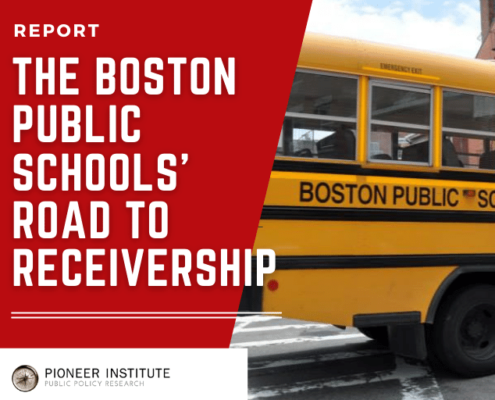
Study Recommends State Receivership for Boston Public Schools
After 15 years of rapid decline marked by low overall performance, yawning achievement gaps, instability, bureaucratic inertia and central office ineffectiveness in the Boston Public Schools (BPS), the Commonwealth should initiate receivership of the district, according to a new study published by Pioneer Institute.

New Pioneer Institute Law Center to Focus on Educational Opportunity, Economic Freedom, and Accountable Government
Pioneer Institute is pleased to announce the formation of PioneerLegal, the first non-profit, public interest law firm of its kind in New England, to defend and promote educational options, accountable government and economic opportunity across the Northeast.
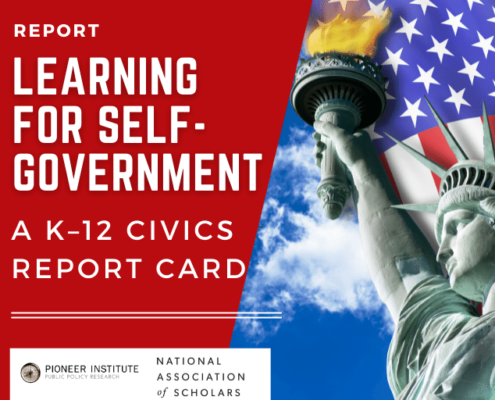
New Study Shows What Works for Civics Education
Americans strongly disagree about how our K-12 schools should teach our system of self-government. Dozens of organizations offer rival civics education resources and many of them don't work. A new study published jointly by Pioneer Institute and the National Association of Scholars offers in-depth evaluations of 15 leading civics programs, grades them on their effectiveness, and offers recommendations for how Americans should build upon these programs.

Study Finds Bus Rapid Transit Can Offer Cost-Effective Benefits
Bus rapid transit (BRT) incorporates unique features such as dedicated lanes to provide reliable and cost-effective service while reducing congestion and its detrimental environmental impacts, according to a new study published by Pioneer Institute.
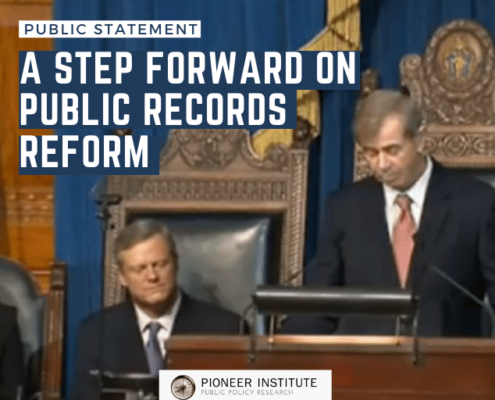
Pioneer Institute Applauds Secretary Galvin’s Legislation to Subject Governor’s Office to Public Records Law, Calls for End to Legislative Exemption
Pioneer Institute applauds Secretary of State William Galvin for filing legislation that would subject the governor’s office to the Commonwealth’s public records law. Since 1997, Massachusetts governors have broadly interpreted the Supreme Judicial Court’s ruling in Lambert v. Judicial Nominating Council to shield themselves from releasing certain documents. Secretary Galvin’s legislation would prohibit future governors from doing so.

Pioneer Supports Legal Challenge to Misleading Tax Ballot Language, Releases Video
Pioneer Institute supports the diverse and bipartisan group that filed a complaint with the Massachusetts Supreme Judicial Court (SJC) challenging the summary language meant to provide an accurate description of the tax hike amendment to voters. The language was approved by the Attorney General and Secretary of the Commonwealth when a similar amendment was proposed in 2018, and unless the lawsuit is successful, will likely appear on the Massachusetts ballot in November.

Study Finds Massachusetts Would Benefit from Adopting Education Savings Accounts
Massachusetts provides fewer options for students to be educated outside their assigned school districts than most other states do, and educational savings accounts (ESAs) offer an effective tool for giving students additional opportunities, according to a new study published by Pioneer Institute.

Study Raises Concern That Annual T Fare Evasion Costs Could Rise By More Than $30 Million Under AFC 2.0
According to the Federal Transit Administration (FTA), the MBTA’s $935.4 million fare collection system (AFC 2.0) that is scheduled to be implemented in 2023 will reduce fare evasion by $35 million over a decade. But the T announced in 2021 that evasion could actually increase by up to $30 million under AFC 2.0, and now a Pioneer Institute study warns that insufficient fare enforcement could drive that figure even higher under the new system.
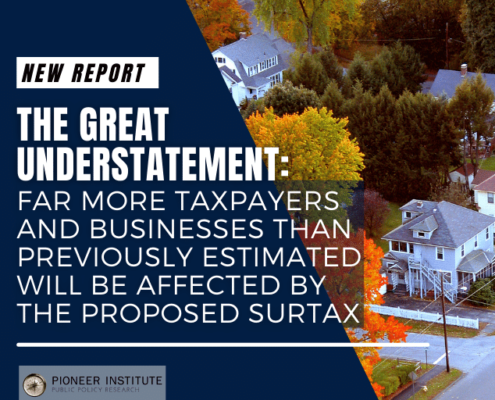
Study: Tax Up For A Vote In November Would Ensnare Over Three Times More Taxpayers Than Previously Estimated
Analyses from the Massachusetts Department of Revenue (MADOR, 2016) and Tufts University’s Center for State Policy Analysis (2022) dramatically underestimated the number of households and businesses impacted by the constitutionally-imposed tax hike that the legislature is putting before voters in November 2022, according to a new study from Pioneer Institute.

Virtual Learning Grows During COVID
Virtual learning in K-12 education continues to grow due to the health threat caused by coronavirus variants and the assistance this learning model can provide to at-risk students, according to two papers released today by Pioneer Institute.

Pioneer Institute Files Amicus Curiae Brief in U.S. Supreme Court School Choice Case
Pioneer Institute has filed an amicus curiae brief in Carson v. Makin urging the Supreme Court of the United States to strike down a provision of Maine law. The Court will hear oral arguments in Carson this morning (December 8) at 10 am. The Maine law being challenged allows districts that don’t have their own schools to contract with a school or pay for students that choose to attend public or private schools, but explicitly excludes religious schools.

The Promise and Challenges of Rare Cancer Treatments
Dr. William Smith, Pioneer Institute's Visiting Fellow in Life Sciences, spoke about the challenges and opportunities for rare cancer treatments, in a video interview produced by Rare Cancers, a patient group based in Australia, for the November 26th CAN Forum.
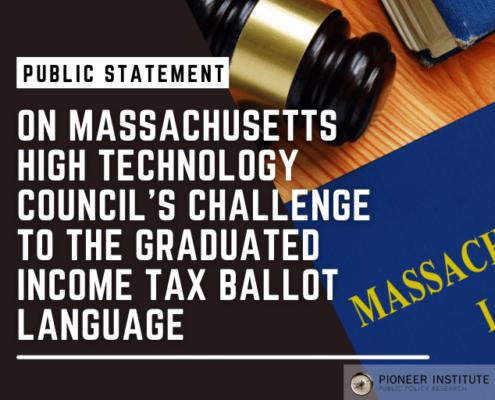
Public Statement on Massachusetts High Technology Council’s Challenge to the Graduated Income Tax Ballot Language
The Massachusetts High Technology Council is right to insist on transparency in the language of a tax hike amendment scheduled to appear on the Massachusetts state ballot next year.

Study: “Millionaire’s Tax” Would Have Far-Reaching Effects on “Pass-Through” Businesses
A proposed graduated income tax that will appear on the statewide ballot in November 2022 will have much more far-reaching implications than most people realize because the surtax also extends to “pass-through” income from entities such as S and limited liability corporations, partnerships, and sole proprietorships that are taxed on individual tax returns, according to a new study published by Pioneer Institute.

Study: Decline in Cardiovascular Health Screenings During COVID-19 Pandemic Poses New Public Health Threat
Pioneer Institute today released a new analysis focused on cardiovascular disease, An “Impending Tsunami” in Mortality from Traditional Diseases?, that examines how the COVID-19 pandemic has created another unrelated public health crisis. The Pioneer analysis examines how a single-minded public health focus on COVID-19, social distancing, and lockdowns drove reductions in screenings, diagnoses, and early treatment for complex conditions such as heart disease.
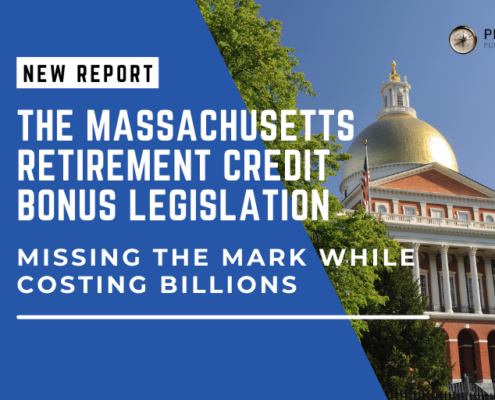
Study: Pandemic Pension Bonus Bills Would Cost Billions and Unfairly Favor Highly Compensated Public Employees
Two identical bills to reward public employees with a retirement credit bonus for working during the COVID-19 emergency are currently pending in each chamber of the Massachusetts Legislature. The bills would add billions of dollars in liabilities to public pension funds and reward workers based on their compensation, years of service and age rather than the type or duration of the work performed during the emergency, according to a new study published by Pioneer Institute.

Study Warns that New Hampshire Tax Policies Would Exacerbate Impacts of a Graduated Income Tax
Drawing on migration patterns between Massachusetts and states like Rhode Island and Tennessee, Pioneer Institute is releasing a study showing a direct correlation between personal income tax rates and household domestic migration patterns between 2004 and 2019. The study suggests that instituting a graduated income tax will shrink the tax base and deter talented workers and innovative employers from coming to and staying in the Bay State.

Pioneer Applauds MassDOT for Allston Project All At-Grade Plan
Pioneer Institute applauds the Massachusetts Department of Transportation (Mass DOT) for its decision to move forward with an all at-grade design for the “throat” area as part of the massive $1.7 billion Allston I-90 Interchange project announced yesterday by State Secretary of Transportation Jamey Tesler. Pioneer had proposed that MassDOT should revise its Scoping Report on the I-90 Allston Multimodal Project and recommend an additional option - a modified at-grade option for the throat area - to the Federal Highway Administration.

Study: After Years of Steady Increases, Homeschooling Enrollment Rose Dramatically During COVID
After steadily increasing for years, the number of parents choosing to homeschool their children skyrocketed during the pandemic, and policy makers should do more to acknowledge homeschooling as a viable option, according to a new study published by Pioneer Institute.

Study Finds SALT Deduction Cap, Graduated Income Tax Will Combine to More Than Double Tax Burden on Some Households
A provision of the federal Tax Cuts and Jobs Act of 2017 strictly limiting deductions for state and local taxes (SALT) will greatly exacerbate the adverse effects of a proposal to create a constitutionally mandated graduated income tax, according to a new study published by Pioneer Institute.
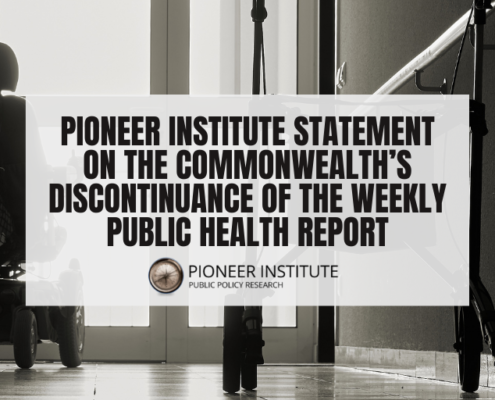
Pioneer Institute Statement on the Commonwealth’s Discontinuance of the COVID-19 Weekly Public Health Report
Useful information about COVID cases or deaths at individual homes has become less available at a time when cases are increasing again, even among vaccinated residents. Pioneer urges Massachusetts to immediately reinstate the so-called Weekly Report, which contains cases and deaths inside individual nursing homes.

Study Suggests How to Advance Fairness, Predictability of “Payment in Lieu of Taxes” Programs Aimed at Nonprofits
A new white paper by Pioneer Institute calls for increased transparency over the basis for payment in lieu of taxes (“PILOT”) agreements between municipal governments and nonprofit organizations, while also encouraging nonprofits to publicize and expand the community benefits they provide.

Public Statement on Implementation of the Charitable Giving Deduction
Despite being awash in cash, the state Legislature just overrode Gov. Charlie Baker’s veto of a provision to delay by yet another year a tax deduction for charitable donations. Rep. Mark Cusack, House chair of the Joint Committee on Revenue, said “it doesn’t mean no, just not now.” If not now, when?

Public Statement on the MA Legislature’s Blanket Pension Giveaway
Beacon Hill just put on full display what happens when it is awash in money. House Bill 2808 is entitled, “An Act relative to providing a COVID-19 retirement credit to essential public workers.” It calls for adding three years of additional retirement credit to state “employees who have volunteered to work or have been required to work at their respective worksites or any other worksite outside of their personal residences during the COVID-19 state of emergency…” But upon reading the brief bill, it quickly becomes clear that this legislation is irresponsible in the extreme.

Study Says Massachusetts Surtax Proposal Could Reduce Taxable Income in the State by Over $2 Billion
As voters now begin to weigh the potential impact of a ballot proposal to increase taxes on business owners, retirees and wealthier households, a new literature review by Pioneer Institute shows that many existing academic studies find that wealthy individuals are particularly sensitive to changes in tax policy. Other studies explicitly warn policymakers that behavioral responses to taxing the rich could erode the tax base and ultimately strain state budgets.

This Is No Time for a Tax Increase
This is no time to threaten Massachusetts’ prospects for an immediate economic recovery and the long-term competitiveness of the Commonwealth’s businesses. As Massachusetts lawmakers prepare to vote on whether to send a proposed constitutional amendment that would impose a 4 percent surtax on residents who earn $1 million or more in a year to the statewide ballot in 2022, Pioneer Institute urges them to recognize that tax policy sizably impacts business and job location decisions and that jobs are more mobile than ever.

Study: Massachusetts Should Retain Additional Healthcare System Flexibility Granted During Pandemic
Massachusetts’ emergency declaration for COVID-19 ends on June 15, and with it some enhanced flexibility that has been allowed in the healthcare system. Some of the added flexibility highlighted barriers that make the system more expensive, harder to access and less patient-centered, and the Commonwealth should consider permanently removing these barriers, according to a new study published by Pioneer Institute.

Study Finds Deep Flaws in Advocates’ Claims that the Massachusetts Tax Code is Regressive
Proponents of a state constitutional amendment to add a 4 percent surtax on all households with annual income above $1 million frequently cite 2015 data from the Institute on Taxation and Economic Policy, which argues that the Massachusetts tax code is regressive, but a new study published by Pioneer Institute debunks many of the underlying assumptions used in ITEP’s 2015 report.
